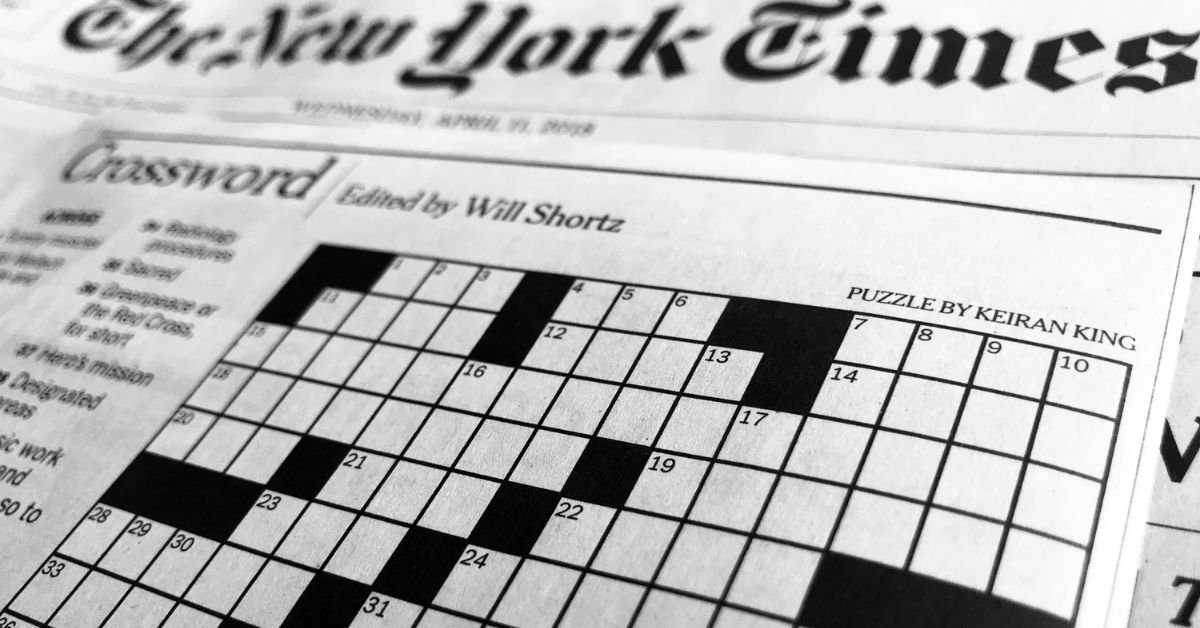Have you ever stumbled upon a crossword clue that left you scratching your head? “122 is the record for humans” is one such puzzler that’s been causing quite a stir among New York Times Crossword enthusiasts.
This enigmatic phrase doesn’t refer to a single specific achievement, but rather serves as a clever misdirection. It’s designed to make solvers think creatively about various human records and milestones across different fields.
What’s the deal with this enigmatic phrase, and why has it captured the imagination of puzzlers across the USA? Let’s dive deep into the world of word puzzles and uncover the secrets behind this perplexing clue.
Introduction to the New York Times Crossword

The New York Times crossword isn’t just any old word puzzle – it’s an institution. For decades, it’s been challenging minds, sparking debates, and bringing people together over shared frustration and triumph. But why does this particular puzzle reign supreme in the hearts of Americans?
It’s all about the perfect blend of accessibility and challenge. The NYT Crossword offers something for everyone, from Monday’s gentle warm-ups to Saturday’s brain-bending marathons. And smack in the middle of this intellectual obstacle course, we find clues like “122 is the record for humans” that stop us in our tracks and make us wonder: what on earth could that mean?
The History and Popularity of the NYT Crossword
To understand why “122 is the record for humans” has caused such a stir, we need to take a quick trip down memory lane. The NYT Crossword first graced the pages of the newspaper in 1942, right in the thick of World War II. It was meant to be a temporary distraction for war-weary readers, but it stuck around, becoming as much a part of American culture as apple pie and baseball.
Fast forward to today, and the NYT Crossword isn’t just surviving – it’s thriving. In the age of smartphones and instant gratification, you’d think a paper-and-pencil puzzle would be old hat. But nope! The crossword has adapted, going digital and mobile, while still maintaining its charm and challenge. It’s a daily ritual for millions, a way to kickstart the brain or wind down after a long day.
And it’s not just about filling in boxes. The NYT Crossword has become a cultural touchstone, reflecting current events, pop culture, and the ever-evolving English language. Clues like “122 is the record for humans” showcase the puzzle’s ability to keep us on our toes, blending knowledge, wordplay, and lateral thinking in ways that keep solvers coming back for more.
More Post: FINTECHASIANET CRYPTO FACTO | A GUIDE TO CRYPTOCURRENCY IN ASIA
Understanding the Clue: 122 is the Record for Humans
Now, let’s tackle this beast head-on. “122 is the record for humans” – what’s that all about? At first glance, it seems impossibly vague. Is it about lifespan? Speed? The number of hot dogs eaten in one sitting?
The beauty of NYT Crossword clues lies in their deceptive simplicity. They’re like little riddles, often relying on double meanings or clever wordplay. In this case, the key is to think beyond the obvious. What kind of records do humans set? And more importantly, in what context would 122 be significant?
Here’s where the fun begins. The clue could be referencing any number of human achievements or milestones. It might be about sports records, scientific breakthroughs, or even quirky Guinness World Records. The “122” could be referring to years, meters, seconds, or something entirely unexpected.
The trick is to consider the puzzle’s theme (if there is one) and look at surrounding clues for context. Is it part of a series of record-breaking clues? Is there a sports or science theme running through the puzzle? These hints can help narrow down the possibilities and guide you towards the correct answer.
Possible Answers to the Clue
Let’s put on our thinking caps and explore some potential solutions to “122 is the record for humans”:
- Olympic gold medals: Could it be referring to the total number of gold medals won by a particular country in the Olympics? While not exactly a “human” record, it’s a cumulative human achievement.
- Free diving record: In 2007, Herbert Nitsch set a record by diving to a depth of 214 meters (702 feet) in the “No Limits” discipline of free diving. While this isn’t 122 exactly, it could be referencing a different category or an older record.
- Age: The oldest verified human lived to be 122 years old. This fits perfectly with the clue and relates directly to human lifespan records.
- Speed: While humans haven’t reached 122 mph on foot, this could be referencing a speed record in a specific category, like skiing or cycling.
- Swing speed in golf: The fastest recorded golf swing speed is around 125 mph. Could 122 mph be a notable milestone in this arena?
Tips for Solving Tricky Clues in NYT Crossword
Faced with a stumper like “122 is the record for humans,” how do seasoned solvers approach the challenge? Here are some tried-and-true strategies:
- Look for wordplay: NYT Crossword clues often have double meanings or puns. Don’t take everything at face value.
- Consider the day of the week: Monday puzzles are usually straightforward, while Saturday clues can be downright devious. Adjust your thinking accordingly.
- Use crossing words: If you’re stuck, solve surrounding clues. The letters you fill in might spark an “aha!” moment.
- Think outside the box: Sometimes, the most obvious answer is wrong. Be willing to consider unconventional interpretations.
- Know your crosswordese: Certain words appear frequently in crosswords but rarely in everyday life. Learning these can give you a leg up.
- Don’t be afraid to guess: If you’re reasonably confident, pencil in an answer. It might help you solve other clues, even if it turns out to be wrong.
- Take breaks: Sometimes, stepping away and coming back with fresh eyes is all you need to crack a tough clue.
Unique Features of the NYT Crossword Puzzle
What sets the NYT Crossword apart from your run-of-the-mill word puzzle? It’s all about quality, consistency, and cleverness. Here’s what makes it special:
- Progressive difficulty: Puzzles get harder as the week goes on, catering to solvers of all levels.
- Cultural relevance: Clues often reference current events, pop culture, and modern language, keeping the puzzle fresh and engaging.
- Clever themes: Many puzzles, especially later in the week, have overarching themes that add an extra layer of complexity and satisfaction.
- High-quality construction: Grids are meticulously crafted to ensure a smooth solving experience with minimal obscure words.
- Expert editing: Under the watchful eye of editors like Will Shortz, each puzzle is polished to perfection.
- Variety: While the daily puzzle is the star, the NYT also offers variety puzzles like acrostics and diagramless crosswords.
Clues like “122 is the record for humans” exemplify the NYT Crossword’s knack for combining knowledge, wordplay, and lateral thinking in ways that challenge and delight solvers.
Other notable records in the world of crosswords
While we’re on the topic of records, let’s look at some mind-boggling achievements in the world of crosswords:
- Fastest solve: In 1996, Stanley Newman completed a NYT Sunday puzzle in just 2 minutes and 14 seconds.
- Longest-running crossword: The Guardian has published a daily cryptic crossword since 1929.
- Largest crossword: In 2007, Lviv, Ukraine unveiled a crossword measuring 100 feet tall and 42 feet wide on the side of a building.
- Youngest constructor: At age 13, Ben Pall became the youngest person to have a crossword published in the New York Times.
- Most prolific constructor: Myles Mellor has created over 60,000 crossword puzzles for various publications.
These records show that whether you’re solving or creating, the world of crosswords is full of impressive human achievements.
More Post
You Might Also Like:
If you enjoyed diving into the world of crosswords and human achievements, you might find these related topics equally fascinating:
- The Science of Puzzle-Solving: How Crosswords Boost Brain Power
- From Notoriety to Nobel: Unusual Human Records That Changed the World
- Crossword Constructors Spill Their Secrets: The Art of Crafting the Perfect Clue
Conclusion
So, what makes a clue like “122 is the record for humans” so special? It’s not just about the answer – it’s about the journey. It represents the perfect blend of knowledge, lateral thinking, and the thrill of discovery that keeps crossword enthusiasts coming back day after day.
Whether the answer turns out to be about Olympic medals, free diving achievements, or something completely unexpected, clues like this remind us why we love crosswords. They challenge us to think differently, to draw connections between seemingly unrelated facts, and to view the world through a lens of curiosity and wonder.












